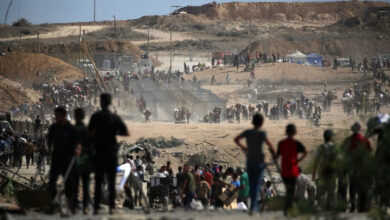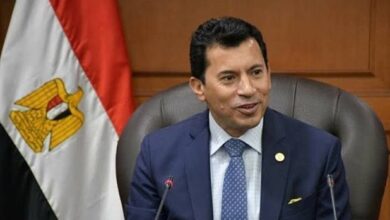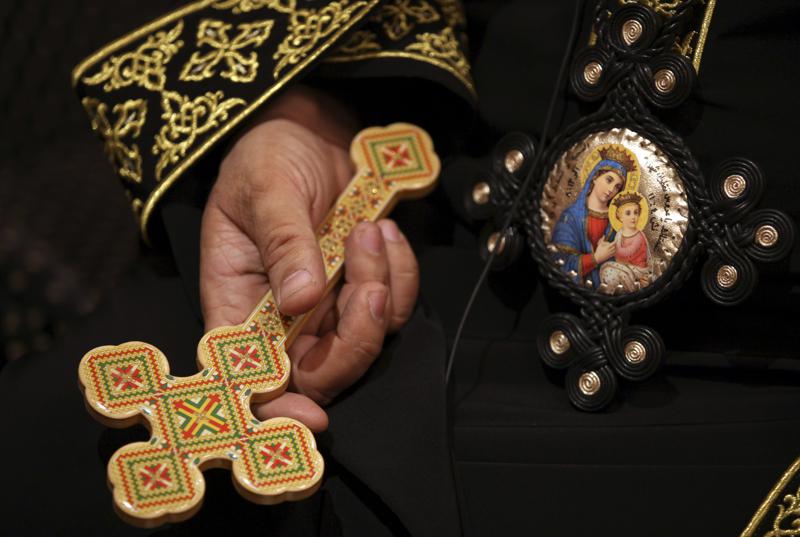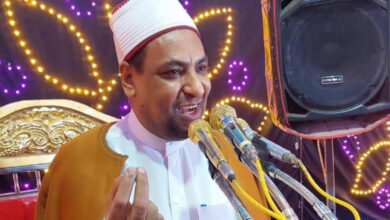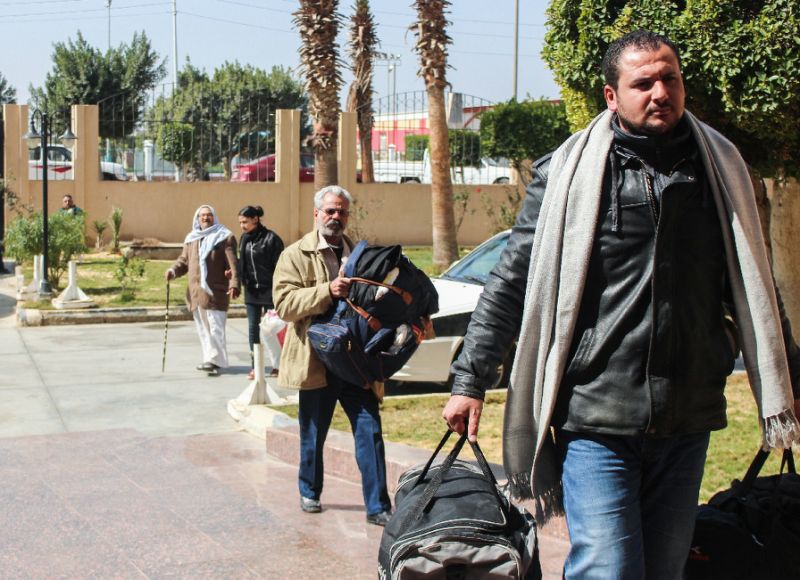
While Saint Anthony's Church in Ismailia declared the state of emergency, Al-Masry Al-Youm (AMAY) was there, as both the church and the state attempt to contain the crisis of the Coptic Christian families displaced from northern Sinai. AMAY spent hours with the children who are being treated psychologically to overcome the crisis,
Families are flocking to the church and others have been housed; children play in the gardens of Ismailia; but an atmosphere of ambiguity surrounds the fate of about 100 Coptic Christian families forced by terrorism to abandon their homes in Al-Arish city of North Sinai, leaving everything behind to take the worries and sorrows of displacement.
The Saint Anthony's Church in Ismailia struggled to feed the displaced until they are all housed and taken care of.
1- Psychological Intervention for the Displaced Kids
Terrorists forced Coptic Christian families and their children in Al-Arish to leave their homes for an unknown fate. They have nothing to face the future with except for a suitcase, which was only enough for some of their clothes and personal belongings, leaving behind their homes and memories.
The departure scene, which was dominated by an atmosphere of anticipating a possible danger, shocked the children psychologically. Perceiving that the trauma had to be contained, the Church prepared psychological treatments for the kids in the form of lectures, in order to get them out of this atmosphere.
The psychologist Mohamed Abdel-Kareem started the session with the kids by playing. He asked each one to say his name then proceeded to pronounce it the wrong way and the kids laughed while trying to correct him.
Abdel-Kareem promised them he'd prepare something funny for the next meeting, but one kid asked him about how much longer will stay; and would there be enough time for all these activities? Most of the kids expressed fear at the tought of returning to Al-Arish.
Father Arsenius, a priest from the Saint George Coptic Orthodox Church, addressed the children saying that "We must be aware that Egypt is the Great Mother in which we find many regions like Arish, Ismailia, Upper Egypt and all the governorates. Arish is a beautiful place and a part of Egypt."
He stressed that the church received the children in a bad psychological state after leaving their homes, schools. They had to be contained, with emphasis that they are still in their home wherever they are; this way they would not feel displaced.
He pointed out that he is keen to spend time with the children and their parents every day, accompanied by priests in individual sessions to ease thier burden, who signed.
Abdel-Kareem said that the psychological rehabilitation sessions is important as the child does not have a full awareness of the causes of the crisis, and the reason why he was forced to emigrate, and this makes him feel unsecure.
And therefore it was necessary to hold such sessions to help them feel safe and secure, adding that there is nothing equivalent of the joy of a child in his home, amid his friends and his neighbors, who he grew up with them.
2- The Church Kitchen
Hands joined together here in order to feed the displaced. Pots and dishes were lined up on the kitchen floor of Saint Anthony's Church, to prepare the meals for all the families.
Nadera Samaan, a worker at the church, prepares various kinds of food for the displaced: "It's now been one week for me without a single day off; we work from 6.00am until 12.00am."
She says the displaced families are about 80, and they were without food for long hours, especially after the terrorists threatened Muslims in Al-Arish not to allow the Copts to stay or feed them. They even tried to prevent the microbus drivers from transferring them to Ismailia.
Nadera says the problem is that the displaced keep coming in waves, making it difficult for her to prepare food for them all at once; but all the time she stands in front of the stove for the processing of meals for each group and for the newcomers.
She says they have prepared dozens of kilos of food, and she has asked for more church volunteers to make the process quicker.
"Whatever we have provided for the displaced is only a drop in the bucket, because they left their homes. There are those who need a fully furnished house again, and there are cases of newly married girls who left their belongings almost new," said Ghada Sobhy, one of the volunteers.
Above the stove were the pots are brimming with cooking food and everyone is waiting, some more displaced people arrive at the very same time.
Sobhy criticizes all the talk about the return of the displaced to their town at the present time, because they are still in in a sate of trauma after losing their sense of security; and thus, this not the time to talk about their return to Al-Arish, as far as she is concerned.
3- The Church Prayer Hall and Reception
Between the families that are still arriving and worshippers arriving to the church for prayers, the tragedy of the displacement is summarized in praying for them that God may remove the sorrow which has touched everyone's lives.
Hanan Hakim, a housewife, is standing at the entrance of the church next to the displaced families. She affirms that prayer is needed all the time, especially in times of crisis, as she believes that getting closer to God is the only way to lift the pain and distress.
Hakim believes that "the real problem is the escape from truth; trying to raise meaningless slogans which are sometimes not relevant to what is actually found on the ground."
Mervat George arrived at the church when the time of prayers was over, and she tells of her reasons for escaping from Al-Arish, saying that her husband received a direct threat either to leave or to be slaughtered, which forced them to leave immediately with "only a bottle of water".
"We have heard about a lot of cases of murder, and I was not wait going to wait for the moment when I see one of my children or my relatives in this situation," George said.
Lamia, another displaced woman, says: "We live on the land of our country and our departure in these circumstances and in this form is not pleasing to anyone."
"They drew swords on our houses, so we left them with everything inside, even though we are very attached to Al-Arish."
Lamia is saddened most she lost the love of her neighbors, who offered her and her family to stay and said they would protect them, even if it cost them their lives. But she and her family did not agree to stay under the circumstances.

